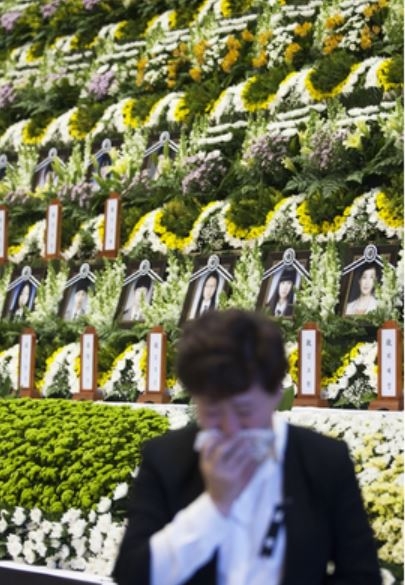The captain ran away
The government has dithered over the rescue
But let’s rekindle the spirit of hope

“I have been crying day and night. I can’t live a day without my child whom I have raised for seven years. Just imagine how much pain mothers who have raised their child for seventeen years would have to cope with.”
(A mother of a 7-year old child)
“I have doubts whether Korea is a safe country to raise my precious kid. There is nothing mothers of missing students who are still trapped in frigid water can do except for waiting endlessly.”
(A housewife in her 30s)
“Since the incident broke out, I have had sleep disorder. Overcoming it is quite tough.”
(A mother of a 9-month old baby)
Recognized as one of the worst peacetime disasters, the submergence of the ferry Sewol laid bare weaknesses of Korea’s disaster management system. Ever since the disaster swept the country, everyone, particularly, mothers have been talking about it. Indeed, losing a child is every parent’s worst nightmare and it could have happened to any child at any time.
Against this backdrop, the Korean government’s rescue efforts were only seen as reactive and insufficient in the eyes of mothers who have sensed that it is dangerous to raise a child in Korea where principles and trust have already been undermined.
A 48-year old Im Hye-yeon who lives in Hongeun-dong in Seoul said “There is an old saying that even heaven mourns for a parent who has lost a child. Every time I came across media outlets covering the recent incident, tears dropped endlessly. Our sympathy goes to the parents of Danwon High School student victims and their families.”
With its per capital GNI nearing $30,000, Korea may boast itself for being on the verge of joining the ranks of advanced countries. However, it still has a long way to go as suggested by the recent ferry disaster and its aftermath.
It is a long-held tradition for the captain to be the last one off a sinking ship. However, the ferry Sewol’s captain abandoned the ship and broke the long-held tradition. Meanwhile, passengers were told to stay put for safety.
To make matters worse, the Central Disaster Countermeasure Headquarters did not effectively use the most crucial time for finding survivors.
The sinking of Sewol was a testament to the fact that people suffer or die if they are naive enough to keep order and have trust in systems implemented throughout society, which are malfunctioning.
All 15 crew members who helped navigate the capsized ship were successful in saving their lives, though they failed to help passengers and manage crisis. They are now accused of negligence and harshly criticized for their unaccountable action that goes against their work ethics.
The famous code of conduct, phrased as “Women and children first” and first applied during the evacuation of HMS Birkenhead ship, was missing. After the captain fled the vessel and arrived at the hospital, he was too busy drying out wet paper money.
The foreign media portrayed the captain as the ‘Devil of Sewol.’ To everyone’s dismay, there may be other devils roaming around across diverse sectors.
Professionals commented that there is a lack of ‘humanware’ in Korea. Professor Choi Seongnam at the Department of Sociology of Ewha Womans University said “The captain Lee Junseok did not qualify for a leading position on the vessel in the first place. Nevertheless, he was named as the captain. That is when morality and fundamentals of the ferry began to fall apart. But this is only a glimpse of what is happening throughout the country.”
Implying that there are numerous irresponsible leaders in society, Choi added “The right and qualifying people should be promoted as leaders. But the reality is that irresponsible and ineligible people who do not know a thing about morality are at the helm of many organizations. We, as the elderly, need to improve the current situation for the next generation.”
Since the ferry disaster which occurred in the West Sea in 1993, the government has barely tightened safety-related regulations nor improved its disaster management system which has been notorious for its appalling conditions.
President Park Geunhye renamed the Ministry of Public Administration and Safety as the Ministry of Safety and Public Administration, highlighting the significance of addressing safety issues. Nevertheless, when the nation’s ability to handle a crisis was put to a test upon the outbreak of the ferry disaster, different branches of the government and military contradicted each other, drawing a criticism that there is no control tower in place.
The public’s distrust in the government only escalated even when Prime Minister Jung Hongwon unveiled the Park administration’s plans to raise public’s awareness of safety issues, and thoroughly investigate to come up with a list of unfair practices and systems that threat public order and safety.
At this tragic time, however, there is still a glitter of hope: A heroine named Park Jiyoung, a part-time crew member, reportedly helped students escape. She told students that the crew must stay on the ship until everyone else leaves, and that she would follow them after helping other passengers.
In addition, according to the National Accident Countermeasure Headquarters, more than 5000 volunteers went to Jindo, an island near the accident site, to join the rescue effort, share the pain, soothe people’s anger, and revive hope. Individuals, companies, and civic groups alike have volunteered. Korean citizens across the nation participated in the Yellow Ribbon Campaign to extend condolences for the victims.
The cause of the ferry’s sinking should be identified and those accountable for it must be punished. At the same time, the nation as a whole can no longer be tied to grief. Bearing in mind lessons learned from the incident, now is the time to breathe new hope and make a new leap forward.

